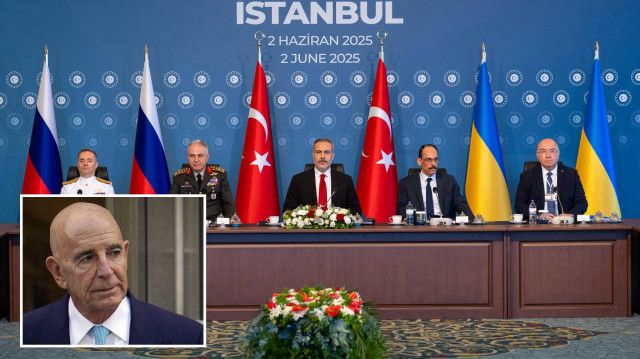US envoy highlights Ankara's strategic role in regional diplomacy

U.S. Ambassador to Ankara and Special Representative for Syria, Tom Barrack, emphasized Türkiye’s pivotal role as a regional power and mediator, particularly in the context of the Russia-Ukraine conflict and the ongoing crisis in Syria.
“Türkiye plays a key role,” Barrack said, praising Ankara's unique diplomatic ties with both Moscow and Kyiv. “Türkiye has a traditional relationship with both Russia and Ukraine, and that makes it an important mediator in establishing dialogue.”
Barrack also highlighted Türkiye’s broader geopolitical influence, describing it as more than just a strong NATO ally. “Everyone always talks about Türkiye as a ‘great NATO ally,’ and of course, there’s no doubt about that. But more importantly, it holds critical regional significance, as we've seen not only in Ukraine and Russia but also in Syria,” he noted.
The ambassador underscored the positive relationship between President Recep Tayyip Erdoğan and former U.S. President Donald Trump, expressing his desire to help strengthen this bond. Commenting on Türkiye’s diplomatic efforts in hosting negotiations in Istanbul, Barrack reiterated, “Türkiye’s balanced relationships allow it to act as a meaningful intermediary in fostering dialogue.”
Speaking on the current state of the Russia-Ukraine war, Barrack said Trump is “at the end of his rope,” signaling the former president’s growing frustration with the protracted conflict.
Turning to Syria, Barrack criticized the legacy of Western intervention in the region. “The Syria policies of today will not resemble those of the past 100 years—none of which have truly worked,” he said. He attributed longstanding instability to the West's attempts to shape the region to its own advantage, beginning with the aftermath of World War I.
Citing historical examples, Barrack remarked, “Let’s start with the Balfour Declaration. Then came Sykes-Picot, where British and French diplomats divided the Ottoman Empire without regard for the region's tribal and religious complexities. The Ottomans had a system that worked, but artificial borders cannot contain such deep-seated divisions.”
He argued that many of the Middle East’s enduring conflicts can be traced to Western efforts to control the region’s future—largely driven by the desire to secure fossil fuel resources.
Responding to a question about the future of U.S. military presence in Syria, Barrack revealed that the number of American bases has already decreased significantly. “From eight bases, we’ve gone down to five, then three, and now just one,” he said.
He added that the U.S. is working to integrate the YPG/PKK—operating under the name Syrian Democratic Forces (SDF)—into the central Syrian government in Damascus. “They are currently living under the protection of U.S. Central Command (CENTCOM), but unless there is broad cooperation, U.S. support will gradually decline,” Barrack warned. “There is immense pressure on all sides to reach a deal.”
Here we are to serve you with news right now. It does not cost much, but worth your attention.
Choose to support open, independent, quality journalism and subscribe on a monthly basis.
By subscribing to our online newspaper, you can have full digital access to all news, analysis, and much more.
You can also follow AzerNEWS on Twitter @AzerNewsAz or Facebook @AzerNewsNewspaper
Thank you!
